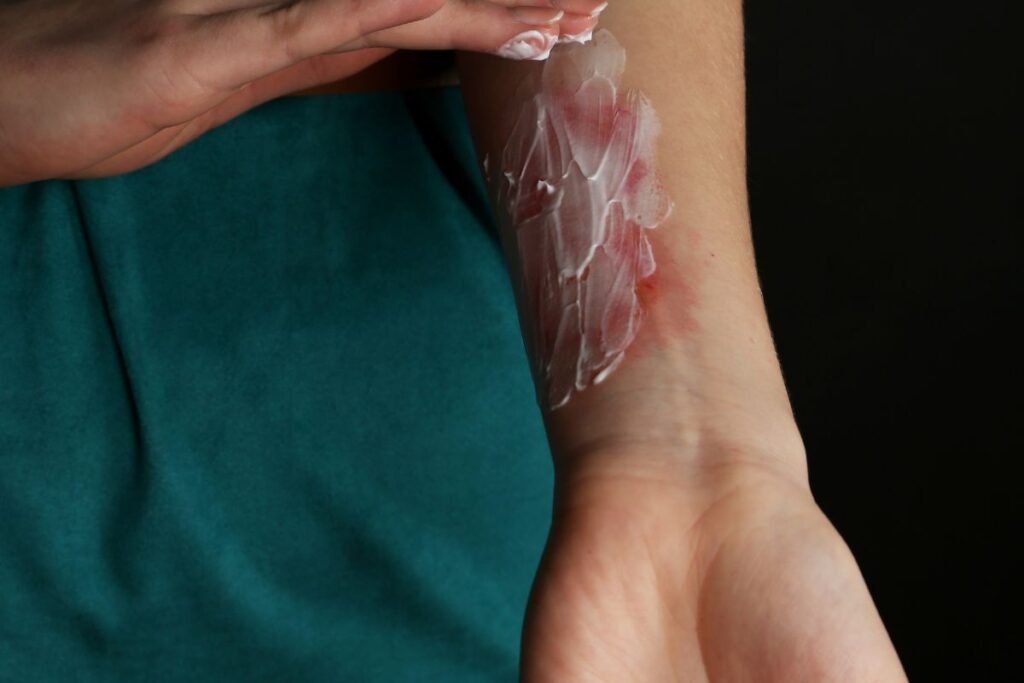You’ve been using steroid creams for years to control skin problems like eczema or psoriasis, but have you ever wondered if these creams are doing more harm than good? It’s time to uncover the truth about steroid creams and why they might be the most abused skin treatment by local quacks.
What Are Steroid Creams?
Inflammatory skin diseases like psoriasis, rashes, and eczema are frequently treated with topical corticosteroids, sometimes known as steroid creams. They reduce swelling, irritation, and inflammation. When used repeatedly or incorrectly, these creams can cause serious side effects and difficulties even though they might offer immediate relief, particularly in cases of extreme inflammation.
The Dark Side of Steroid Creams: Why You Should Be Cautious
1. Skin Thinning:
Overuse of steroid creams can cause the skin to become thinner, making it more prone to tearing, bruising, and stretch marks. Chronic use on delicate areas like the face can lead to irreversible thinning of the skin.
2. Steroid Addiction:
Prolonged use of steroids can lead to steroid addiction, where your skin becomes dependent on the cream to function properly. This means that once you stop using the cream, your skin may flare up worse than before, leading to a cycle of dependency.
3. Increased Risk of Infections:
Steroid creams can suppress the skin’s natural immune response, making it easier for bacterial, viral, or fungal infections to occur. A common side effect is the development of fungal infections or cold sores in areas where steroids have been used frequently.
4. Rosacea and acne:
Long-term use of steroid creams can lead to rosacea, a condition where the skin becomes red, inflamed, and pimpled, resembling acne. It can also exacerbate acne, leading to breakouts in areas where the cream is applied.
5. Systemic Effects:
Although rare, excessive use of high-potency steroid creams over large areas of skin can lead to systemic absorption, affecting your overall health. This can cause adrenal suppression, a condition where your adrenal glands stop functioning properly, leading to fatigue and other health problems.
What to Do If You’re Using Steroid Creams
It’s important to use steroid creams carefully and under the guidance of your doctor. What you can do is as follows:
1. Follow Doctor’s Instructions:
Never use a steroid cream without a prescription, and always follow the instructions regarding how much to use and how often to apply it.
2. Limit Use to Short-Term:
Steroid creams should be used for short-term relief only and not as a long-term solution.
3. Alternative Treatments:
There are safer, long-term treatments for conditions like eczema or psoriasis. For example, moisturising creams, non-steroidal treatments, or phototherapy can be more effective without the risk of side effects.
4. Consult a Dermatologist:
If you have used steroid creams for an extended period or have sustained complications or side effects such as thinning skin or skin redness, you owe it to yourself to see a dermatologist for advice and other means of treatment.
Frequently Asked Questions
Are steroid creams safe to use?
Yes. Just use it for shorter durations and under the supervision of a doctor. If you overuse it, it can damage your skin.
Can steroid creams cause permanent damage?
Yes, chronic use can cause permanent skin damage, such as skin thinning, stretch marks, or scarring.
What should I do if my skin is addicted to steroids?
If you are using steroid creams and suspect addiction to rely on them, you need to see a dermatologist without delay. They can help you off those steroids safely and show you how to go on with other treatments instead.
How HealthPil Can Help:
At HealthPil, we connect you with experienced dermatologists who can offer safe, effective alternatives to steroid creams. Whether you’re dealing with eczema, psoriasis, or skin allergies, our specialists will provide you with personalized treatment options that reduce reliance on steroids while addressing your skin concerns.
Disclaimer:
This article is for informational purposes only and should not replace professional medical advice. Always consult a healthcare provider before starting or stopping any treatment for skin conditions.

